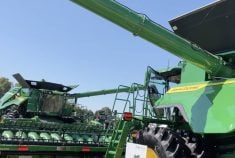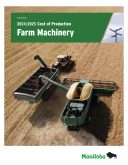Treating farm data like it’s a natural resource or comes ‘from on high’ makes it harder to see the forces that shape and profit from it, contends a new book.
Read Also

Use-it-up meals stretch the post-holiday menu
Leftovers and extra food abound in the first weeks of January. Give your kitchen a winter reset, clean out the fridge and save on your grocery bill

“In agriculture, just like in other contexts… there are really powerful interests behind the collection of data and the use and misuse of data,” said author Kelly Bronson in an interview with the Co-operator.
Bronson is Canada Research Chair in Science and Society at the University of Ottawa.
In her book The Immaculate Conception of Data, she examines a predominant way of looking at agricultural data and technology as raw material, untouched by human hands or biases.
This is especially true with ‘big ag’ and agribusiness, but Bronson also shows how small-scale ‘activist’ farmers, who use open-source data and cheap electronics, fall into the same trap.
There’s a growing awareness among social media users that Facebook (Meta, as it’s now called), Google and the other overlords of the internet collect data from users and use it to target people with ads or sell data sets to other companies.
More nefarious uses of data have gotten a lot of press.
In 2018, it was revealed that Facebook had sold data to marketing firm Cambridge Analytica, which used it to target voters with ads and political messages during the 2016 U.S. presidential election, CBC reported that year.
“[Big agribusiness companies] increasingly centre their business models on the collection and processing of data,” writes Bronson. However, public scholars have given this little critical attention.
The ‘immaculate conception of data’ mindset (she calls it ‘ICD’ throughout the book) helps big agribusiness stay under the radar. It also strengthens their pitch to farmers and investors.
Solving problems digitally
Tech leaders and companies pitch digital agriculture as a problem solver.
Bronson describes a 2012 video from John Deere that envisions a not-too-distant future where data collected by farm machinery alerts farmer “Terry” to an impending storm, tells him when best to irrigate, and where his tractor drives itself while he farms from his living room.
[RELATED] Cybercriminals target equipment manufacturers
Of course, John Deere machinery already generates a wealth of data from the time the farmer opens the cab door. Computer algorithms find patterns and insights in that data, and farmers can pay to get those analytics to inform their decisions.
“Most corporate data scientists predict that in the future, data-driven advice will be delivered in ‘real time’ to ‘smart’ farm equipment, which will use data mining to make micro-adjustments to farm equipment, which will use micro-adjustments to farm tasks,” writes Bronson.
A common phrase is “data-driven agriculture,” as if the data itself was solving problems, untouched by human biases.
That “works to invisibilize” all the people and human decisions that go into deciding what data is collected, how it gets used and which interests it serves, Bronson said.
Paying twice
Which interests does farm data serve?
It’s almost impossible to tell, Bronson told the Co-operator. In her attempts to research it, she found most of that information hidden behind legal mechanisms. People wouldn’t talk to her about it.
She suggested that past behavior may predict future behavior. Input suppliers have used price discrimination before, she said. If they had access to large amounts of farm-level data, they may be able to more accurately pinpoint regional needs and increase prices accordingly.
It also ticks people off that ag companies are creating huge profits with data that farmers collect, Bronson said.
Facebook users pay for this ‘free’ platform with their data. Farmers pay to use their own data, plus agribusiness companies can sell the data sets for another round of profits.
“[Farmers] are paying twice,” Bronson said.
Technologies can solve problems, Bronson said. However, if the “political economy surrounding them and the legal infrastructure surrounding them is not organized really carefully… then we could land ourselves in trouble.”
















